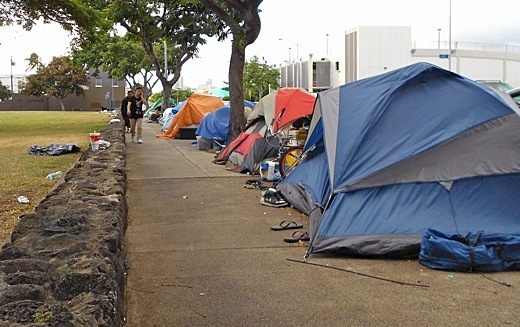By Larry Geller on 10 April 2012 for Disappeared News -
(http://www.disappearednews.com/2012/04/federal-report-condemns-criminalization.html)

Image above: Homeless campers have built a village on the sidewalk between busy King Street and Stadium Park in Honolulu .From (http://www.civilbeat.com/articles/2011/11/24/14005-city-to-sweep-homeless-from-stadium-park/).
A new federal report just issued by the U.S. Interagency Council on Homelessness and the U.S. Department of Justice: Searching Out Solutions: Constructive Alternatives to the Criminalization of Homelessness takes aim at municipalities that have attempted to deal with homelessness by criminalizing the homeless.
The report begins:
In recent years, the United States has seen the proliferation of local measures to criminalize “acts of living” laws that prohibit sleeping, eating, sitting, or panhandling in public spaces. City, town, and county officials are turning to criminalization measures in an effort to broadcast a zero-tolerance approach to street homelessness and to temporarily reduce the visibility of homelessness in their communities. Although individuals experiencing homelessness should be afforded the same dignity, compassion, and support provided to others, criminalization policies further marginalize men and women who are experiencing homelessness, fuel inflammatory attitudes, and may even unduly restrict constitutionally protected liberties. Moreover, there is ample evidence that alternatives to criminalization policies can adequately balance the needs of all parties. Community residents, government agencies, businesses, and men and women who are experiencing homelessness are better served by solutions that do not marginalize people experiencing homelessness, but rather strike at the core factors contributing to homelessness.In a short list, the report highlights these criminalization strategies:
- Legislation that makes it illegal to sleep, sit, or store personal belongings in public spaces
- Ordinances that punish people for begging or panhandling in order to move people who are poor or homeless out of a city or downtown area
- Local measures which ban or limit food distribution in public places in an attempt to curb the congregation of individuals who are homeless
- Sweeps of areas in which people who are homeless are living in order to drive them out of those areas
- Selective enforcement of neutral laws such as jaywalking, loitering, and open container laws against people who are homeless
- Public health ordinances related to public activities and hygiene (e.g. public urination) regardless of whether public facilities are available
Police sweeps here are a matter of public record and occasionally make the news.
And finally, Honolulu is notoriously short of public toilets.
The report warns that such policies "undermine real solutions" and may violate the constitutional and human rights of homeless people, as well as U.S. treaty obligations under the International Covenant on Civil and Political Rights and the Convention Against Torture.
Maria Foscarinis, executive director of National Law Center on Homelessness and Poverty stated in a press release:
We have long advocated for federal leadership to protect the civil and human rights of homeless people, and this recognition of those rights is an important step forward."
The true significance of the report will depend on the federal government's willingness to hold local communities accountable to protect these rights, instead of allowing cities to violate them—often while using federal funds. In addition, the federal government should provide resources to make the constructive alternatives it calls for—especially housing—possible."
[The report does] up the ante for further action by stating explicitly that criminalizing the life-sustaining behaviors of homeless persons implicates not just domestic law, but also our international human rights obligations under the International Covenant on Civil and Political Rights and the Convention Against Torture. Continued advocacy will certainly be needed, but this report will help us make the case.Whether the involvement of the DOJ in issuing this report foreshadows federal civil rights action against states or municipalities remains to be seen, but the report should provide encouragement to advocates and attorneys working against criminalization of “acts of living.” The report is specific (citations omitted in this snip):
Homeless individuals who have been forced to leave an area or whose belongings have been confiscated by law enforcement during sweeps of homeless encampments have successfully brought civil rights challenges on the grounds that law enforcement violated their Fourth Amendment rights to be free from unreasonable search and seizure and their due process rights. The Fourth Amendment also serves as a basis to challenge government actors who confiscate an individuals’ property during sweeps and either destroy, or fail to provide meaningful procedures to reclaim seized property. Laws imposing criminal penalties for engaging in necessary life activities when there are no other public options that exist have been found to violate the Eighth Amendment.Unfortunately, it is expensive to mount a challenge in federal court, so that any challenge to police practices such as we have seen in Honolulu would have to be initiated by advocacy groups with a sufficient budget to carry them forward successfully.
.
No comments :
Post a Comment